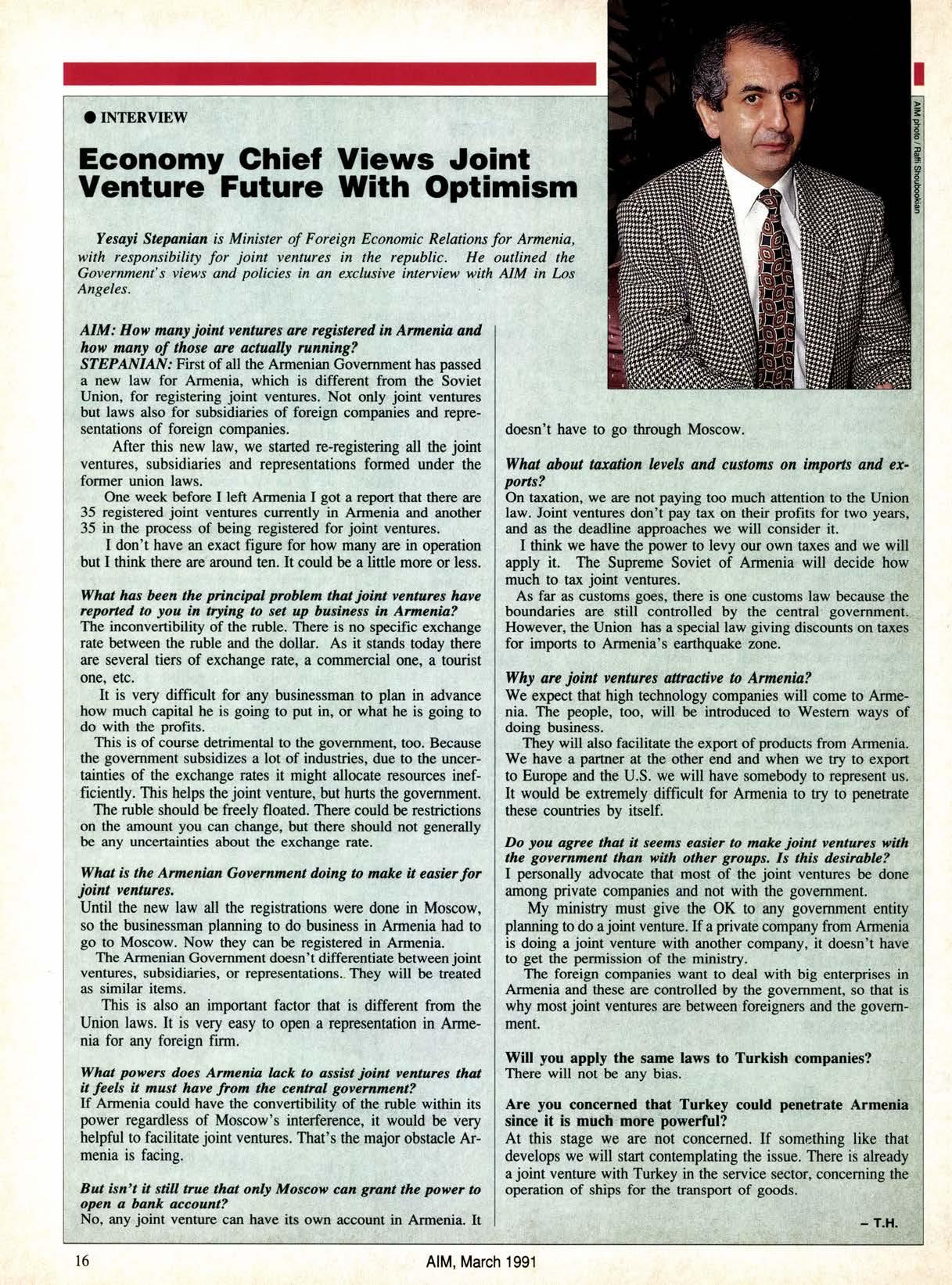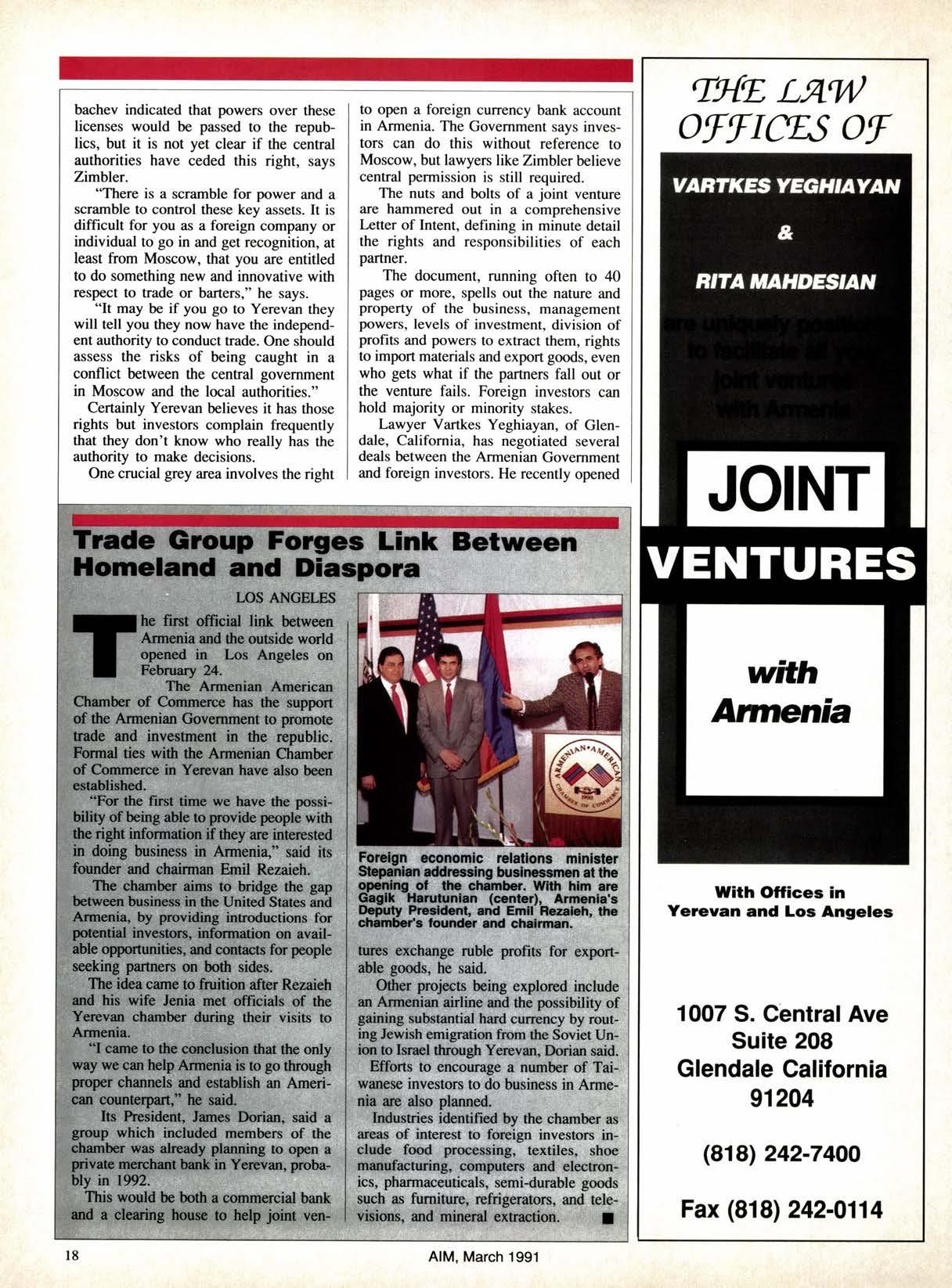
4 minute read
Economy Ghief Views Joint Venture Future With Optimism
Yesayi Stepanian is Minister of Foreign Economic Relations for Armenia, with responsibility for joint ventures in the republic. He outlined the Government's views and policies in an exclusive interview with NM in Los Angeles.
AIM: How many joint ventures are registered in Annenia and how many of those are odually running?
Advertisement
STEPANIAN.' First of all the Armenian Govemment has passed a new law for Armenia, which is different from the Soviet Union, for registering joint ventures. Not only joint ventures but laws also for subsidiaries of foreign companies and representations of foreign companies.
After this new law, we started re-registering all the joint ventures, subsidiaries and representations formed under the former union laws.
One week before I left Armenia I got a report that there are 35 registered joint ventures currently in Armenia and another 35 in the process of being registered for joint ventures.
I don't have an exact figure for how many are in operation but I think there are around ten. It could be a little more or less.
What has been the principal problem that joint ventures have reported to you in Wing to set up business in Armenia?
The inconvertibility of the ruble. There is no specific exchange rate between the ruble and the dollar. As it stands today there are several tiers of exchange rate, a commercial one, a tourist one, etc.
It is very difficult for any businessman to plan in advance how much capital he is going to put in, or what he is going to do with the profits.
This is of course detrimental to the government, too. Because the govemment subsidizes a lot of industries, due to the uncertainties of the exchange rates it might allocate resources inefficiently. This helps the joint venture, but hurts the govemment.
The ruble should be freely floated. There could be restrictions on the amount you can change, but there should not generally be any uncertainties about the exchange rate.
What is the Armenian Government doing to make it easiar for joint ventures.
Until the new law all the registrations were done in Moscow, so the businessman planning to do business in Armenia had to go to Moscow. Now they can be registered in Armenia.
The Armenian Govemment doesn't differentiate between joint ventures, subsidiaries, or representations. They will be feated as similar items.
This is also an important factor that is different from the Union laws. It is very easy to open a representation in Armenia for any foreign firm.
lVhat powers does Armenia lack to assist joint ventures that it feels it must have from the central government?
If Armenia could have the convertibility of the ruble within its power regardless of Moscow's interference, it would be very helpful to facilitate joint ventures. That's the major obstacle Armenia is facing.
But isn't it still true that only Moscow can grant the power to open a bank account?
No, any joint venture can have its own account in Armenia. It doesn't have to go through Moscow. bachev indicated that powers over these licenses would be passed to the republics, but it is not yet clear if the central authorities have ceded this right, says Zimbler.
Whal ubout taxatian levels and customs on imports and exports?
On taxation, we are not paying too much attention to the Union law. Joint ventures don't pay tax on their profits for two years, and as the deadline approaches we will consider it.
I think we have the power to levy our own taxes and we will apply it. The Supreme Soviet of Armenia will decide how much to tax joint ventures.
As far as customs goes, there is one customs law because the boundaries are still controlled by the central government. However, the Union has a special law giving discounts on taxes for imports to Armenia's earthquake zone.
Why are joint ventures altractive to Armenia?
We expect that high technology companies will come to Armenia. The people, too, will be introduced to Western ways of doing business.
They will also facilitate the export of products from Armenia. We have a partner at the other end and when we try to export to Europe and the U.S. we will have somebody to represent us. It would be extremely difficult for Armenia to try to penetrate these countries by itself.
Do you agree thal il seems easier to make joint ventures with the government than with other groups. Is this desirable?
I personally advocate that most of the joint ventures be done iunong private companies and not with the govemment.
My ministry must give the OK to any govemment entity planning to do a joint venture. If a private company from Armenia is doing a joint venture with another company, it doesn't have to get the permission of the ministry.
The foreign companies want to deal with big enterprises in Armenia and these are controlled by the govemment, so that is why most joint ventures are between foreigners and the government.
Will you apply the same laws to Turkish companies?
There will not be any bias.
Are you concerned that Turkey could penetrate Armenia since it is much more powerful?
At this stage we are not concerned. If something like that develops we will start contemplating the issue. There is already a joint venture wilh Turkey in the service sector, conceming the operation of ships for the transport of goods.

"There is a scramble for power and a scramble to control these key assets. It is difficult for you as a foreign company or individual to go in and get recognition, at least from Moscow, that you are entitled to do something new and innovative with respect to trade or barters," he says.
"It may be if you go to Yerevan they will tell you they now have the independent authority to conduct trade. One should assess the risks of being caught in a conflict between the central govemment in Moscow and the local authorities."
Certainly Yerevan believes it has those rights but investors complain frequently that they don't know who really has the authority to make decisions.
One crucial grey area involves the right to open a foreign currency bank account in Armenia. The Govemment says investors can do this without reference to Moscow, but lawyers like Zimbler believe central permission is still required.
The nuts and bolts of a joint venture are hammered out in a comprehensive Ictter of Intent, defining in minute detail the rights and responsibilities of each partner.
The document, running often to 40 pages or more, spells out the nature and property of the business, management powers, levels of investment, division of profits and powers to extract them, rights to import materials and export goods, even who gets what if the partners fall out or the venture fails. Foreign investors can hold majority or minority stakes.
Lawyer Vartkes Yeghiayan, of Glendale, Califomia, has negotiated several deals between the Armenian Government and foreign investors. He recently opened











